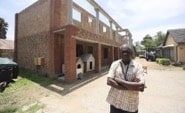Law has been used as an instrument of terror towards indigenous South Africans. The terrorism that saw the displacement of aboriginal Black South Africans and the new South African regime was ‘legal’. With the recent case of Mr Nyepane Shilane, a pensioner who was ordered to demolish a block of flats he built on his property because he did not have the correct permits, the legal terrorism seems to continue unabated.
South African law presents one of the most apt examples of the pitfalls of positivism. The oppression that the indigenous/aboriginal South Africans suffered through, from the Commandos and the Trekkers to the British and Afrikaner jurisdictions that combined for South Africa to be born, were sanctioned by ‘law’.
The most famous instance is the Natives Land Act of 1913 passed by the South African Parliament. More examples are included in the waves of legislation in the 1940s after the National Party came into power, or the multitudes of edicts before 1913 passed in the Boer Republics or the Cape British Colony.
All these edicts were passed by a system that operated in much the same way as what happens today. Individuals in a forum somewhere decided on behalf of others what people could and couldn’t do. They sought to regulate action, even though no conflict between two parties existed.
The laws which Mr Shilane violated when he erected buildings on his land without the permission of other people were passed and operate on the same substantive level as other past legislation as mentioned above. No one was harmed, no one’s property was transgressed, yet the action of building without seeking permission from your overlords is sanctionable.
One might say that currently in South Africa the representatives at the law-making forum are voted for by everyone, and as such represent the wishes of everyone. This is partly true in that after the first democratic election and the adoption of the 1996 Constitution, the representatives did come from a larger pool. Therefore, Mr Shilane can choose his representative every election cycle.
Yet the government which replaced the indigenous customs is one where the majority rules. In what the author considers a crass form of the expression of democratic institutions, majoritarianism is the deciding factor. Indigenous jurisdictions are documented to have had consensus-based democratic institutions, which make sure no one is run over by the mob.
Therefore, Mr Shilane could hypothetically vote for a candidate that opposes zoning regulations and the necessity for building permits. However, if that candidate does not obtain a majority to even get to the forum/legislature, Mr Shilane must be governed by ideas with which he clearly disagrees. I ask whether this is not injustice and terror, wearing the long robes of the law to conceal that lady justice is not present?
The Constitution of South Africa, 1996, tasks provinces to deal with issues concerning building licenses and regulation or zoning which forms part of city or town planning in s104(1), with s104(1)(c) being the provision which allows municipal councils like the Ekurhuleni one in Mr Shilane’s story to pass laws as delegated to them by the provincial legislature.
Outside of the baked-in injustice of the majoritarian democratic system mentioned above, the practical difficulty of being aware of such laws, complying or possibly changing them, make their real experienced injustice much more apparent.
If a retired professional in Mr Shilane found it hard to navigate the legal environment around building, then one can only imagine the informal settlement dweller who wants to build a brick house but must be aware of the zoning of his area, seek permits and pay the municipality money before any building could even begin.
Municipal councils are supposed to be the most accessible level of the government in that they are ‘closest’ to the people. Yet given the spatial history of South Africa, this is not usually the case, and it means that these councils sit far away from the residential areas of many black South Africans. This makes it hard to be involved in the legislative process, thus being a possible reason for a lack of compliance.
The injustice made normal through laws such as zoning should not be accepted. We have shown how claiming that someone who hurt no person or property is doing something illegal is unjust. The practical difficulties of complying with such laws was highlighted too, showing that the South African reality is not amenable to such edicts.
Mr Nyepane Shilane will be forced to demolish his property. A property which was the result of decades of saving will be destroyed. Why? Because Mr Shilane dared not tell his governmental overlords – who are ironically referred to as civil servants – that he was building a residential structure on his own property. If this is justice, then one can only shudder at the thought of what would be considered unjust.
[Photo: Alaister Russell for the Sunday Times]
Zakhele Mthembu BA Law LLB (Wits) is a legal researcher at the Free Market Foundation. The views expressed in the article are the author’s and not necessarily shared by the members of the Foundation.
The views of the writer are not necessarily the views of the Daily Friend or the IRR.
If you like what you have just read, support the Daily Friend.

